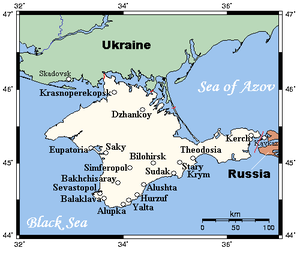Days of secessionist protests and growing violence in the Crimea have spun even further out of the Ukrainian interim government’s ability to control them. Armed fighters from some unnamed militia have seized two major Crimean airports, and Russia has deployed troops around their naval base at Sevastopol.
 Russia insists the deployments are limited to protecting the base, and are in keeping with formal agreements about the rental of what has been Russia’s Black Sea Fleet base for centuries. Ukrainian officials have sacked their own military chief of staff, and instead of debating the language of the base agreement are trying to conflate the deployments around the base with the seizures of the airports and the pro-secession protests as one big Russian invasion.
Russia insists the deployments are limited to protecting the base, and are in keeping with formal agreements about the rental of what has been Russia’s Black Sea Fleet base for centuries. Ukrainian officials have sacked their own military chief of staff, and instead of debating the language of the base agreement are trying to conflate the deployments around the base with the seizures of the airports and the pro-secession protests as one big Russian invasion.
Interim President Oleksandr Turchinov insisted Russia has carried out an “armed invasion” of the Crimea, claiming it was “fully analogous” with the 2008 Russo-Georgian War, “when having initiated a military conflict, they started to annex the territory.”
Turchinov’s history is more than a bit off on the 2008 war, as Georgian troops actually attacked the Russian troops deployed in South Ossetia first, sparking a brief armed conflict in which Russian troops quickly moved in to the secessionist republics of South Ossetia and Abkhazia. Russia didn’t annex either territory, however, and simply recognized their independence, which was already de facto before the war, as official.
Officials from the Ukraine’s new government are pushing the UN Security Council to intervene as well to end the secessionist movement in the Crimea and ensure “territorial integrity” of the state. A 15-minute closed door session was confirmed, but with Russia a permanent member of the council it’s hard to imagine the bellicose anti-Russian tone being put into a resolution on the Crimea.


